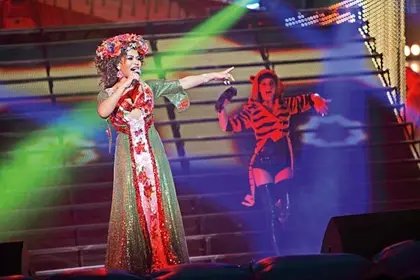Gaitana-Lurdes Essami is a 32-year-old black singer born and raised in Ukraine to a Congolese father and a Ukrainian mother. She was picked for Eurovision through a mixed vote of jury members and fans during a live TV program on Feb. 18. She will sing a song called “Be My Guest” at the Eurovision contest in Azerbaijan’s capital Baku in late May.
Yet at least one person did not like it. Yuriy Syrotyuk, a senior member of Svoboda party, said that “Gaitana is not an organic representative of the Ukrainian culture.” He added that she is a “great singer,” nevertheless.
- Read the newest Ukraine news stories published today.
- Russian Losses in Ukraine War
JOIN US ON TELEGRAM
Follow our coverage of the war on the @Kyivpost_official.
“Eurovision is our chance to promote Ukraine,” Syrotyuk said. “As we want to be accepted to the European Union, it could be our opportunity to show the Europeans that we are also a European nation. We need to show our originality,” he told Kyiv Post on Feb. 21.
Syrotyuk said that the Ukrainian band Gaydamaky would be a better choice, while Gaitana, “who represents another race, will provoke an association of Ukraine as a country of a different continent.”
His comments provoked outrage among Ukraine’s artistic and online communities, but not much political reaction.
Ukrainian boxer Vitaliy Klitschko’s UDAR party has the swiftest reaction to his comments, releasing a statement on Feb. 21 accusing Syrotyuk of racism and xenophobia.
“I am sure Gaitana is more Ukrainian than those who are running around wearing vyshyvankas (embroidered shirts),” Klitschko later said. Other politicians followed: Olena Bondarenko and Hanna Herman, both from the Party of Regions, made statements.
Singer Marichka Burmaka said on her Facebook page that “with friends like these you need no enemies,” and wished Gaitana luck at the contest, which Ukraine won in 2004.
Eduard Klym, Gaitana’s producer and husband, says that if there’s something that feeds the unflattering stereotypes about Ukraine, it’s precisely the kinds of statements made by Svoboda’s representative.
“It doesn’t even hurt,” Klym said. “We just feel shame for our society.”
Gaitana herself held a press conference on the issue on Feb.22, saying that the racism statements set a new mission for her : “ to show to the whole world that Ukraine is open, that everyone can come and stay here without any fear, whatever race he is, whatever language he speaks. Be our guest.”
Klym believes that Gaitana has everything to win the contest, but said that political and social factors also weigh in on victory.
“It’s not the name of the contestant that is showed in the corner of the screen, but the number and the country’s flag,” he explains. “But we will do everything possible to present the best show we can.”
Walid Harfouche, deputy head of the state-run UT-1 channel and co-organizer of the national selection, also believes that the nation picked a strong representative. “On Feb. 18 everyone felt that the song is strong and positive,” he says. “Gaitana herself is full of positive energy. It was a real feast.”
Harfouche says he hopes that people like Syrotiuk will understand that their remarks “stir up conflicts among Ukrainians.”
Kyiv Post staff writer Alyona Zhuk can be reached at [email protected]
You can also highlight the text and press Ctrl + Enter




